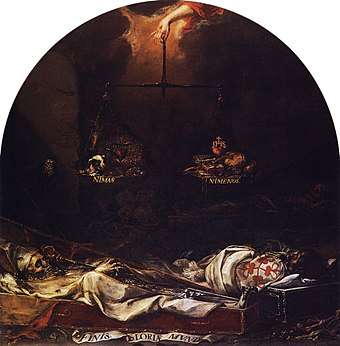Sic transit gloria mundi
Sic transit gloria mundi (sometimes shortened to STGM) is a Latin phrase that means "Thus passes worldly glory".

Origin
The phrase was used in the ritual of papal coronation ceremonies between 1409 (when it was used at the coronation of Alexander V)[1] and 1963. As the newly-chosen pope proceeded from the sacristy of St. Peter's Basilica in his sedia gestatoria, the procession stopped three times. On each occasion, a papal master of ceremonies would fall to his knees before the pope, holding a silver or brass reed, bearing a tow of smoldering flax. For three times in succession, as the cloth burned away, he would say in a loud and mournful voice, "Pater Sancte, sic transit gloria mundi!" ("Holy Father, so passes worldly glory!")[2]
These words, thus addressed to the pope, served as a reminder of the transitory nature of life and earthly honors. The stafflike instrument used in the aforementioned ceremony is known as a "sic transit gloria mundi", named for the master of ceremonies' words.[3][4][5]
A form of the phrase appeared in Thomas à Kempis's 1418 work The Imitation of Christ: "O quam cito transit gloria mundi" ("How quickly the glory of the world passes away").[6][7]
See also
- Memento mori
- This too shall pass
- Vanitas
- In ictu oculi, the companion painting to Finis gloriae mundi
References
- Elizabeth Knowles, ed. (2005). The Oxford Dictionary of Phrase and Fable (Second ed.). Oxford University Press. ISBN 978-0-19-860981-0.
- "Pope John XXIII Coronation Video - Sic Transit Gloria Mundi".
- King, William Henry Francis (1904), Classical and Foreign Quotations, London: J. Whitaker & Sons, p. 319, retrieved November 10, 2010
- Richardson, Carol M., Reclaiming Rome: cardinals in the fifteenth century, p. 393, retrieved November 10, 2010
- Bak, János M., Coronations: medieval and early modern monarchic ritual, p. 187, retrieved November 10, 2010
- Oxford Dictionary of Phrase and Fable (via Oxford Reference)
- à Kempis, Thomas. "Book 1 Chapter 3". Imitation of Christ: translated from Latin into English. Christian Classics Ethereal Library. Retrieved 11 November 2010.